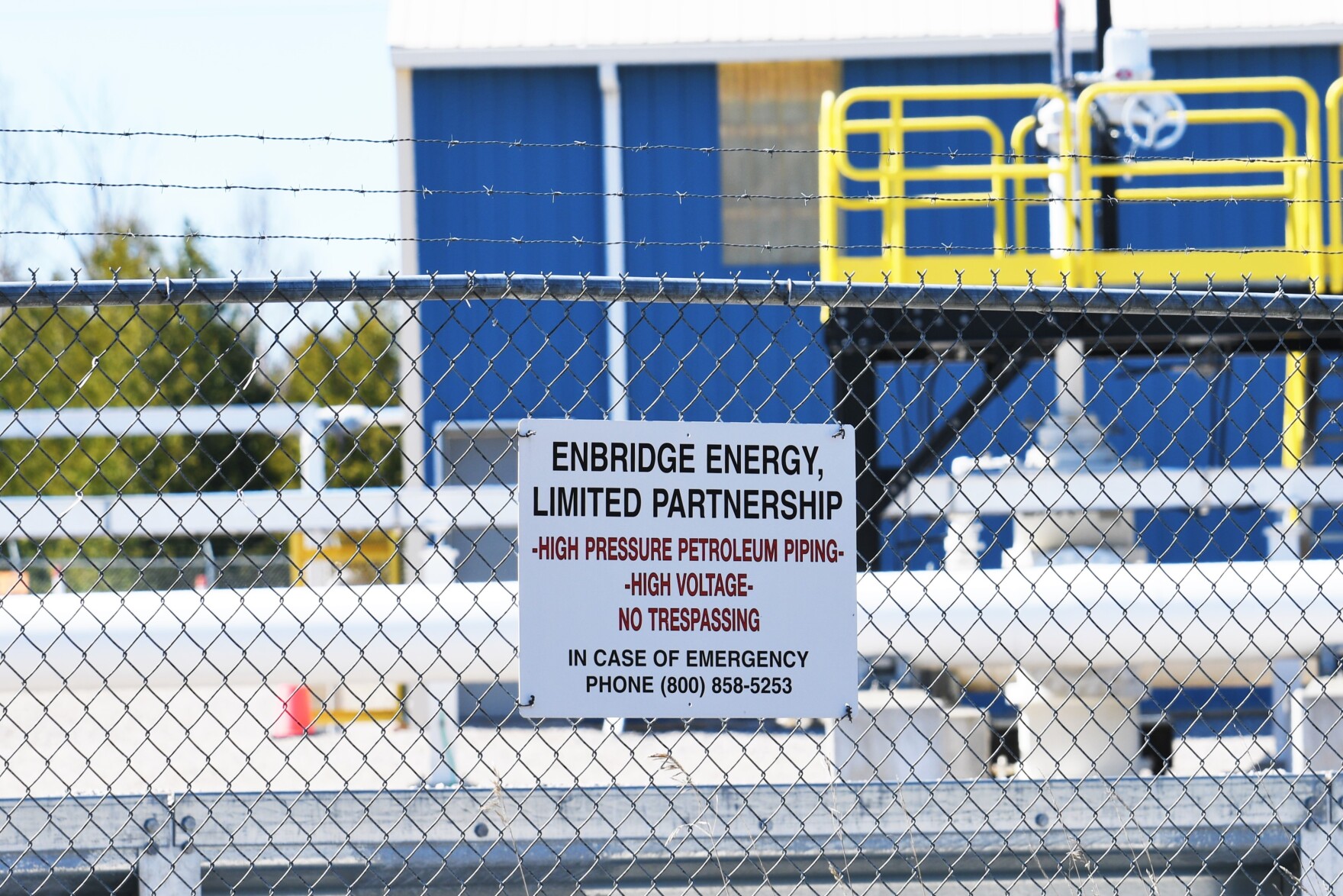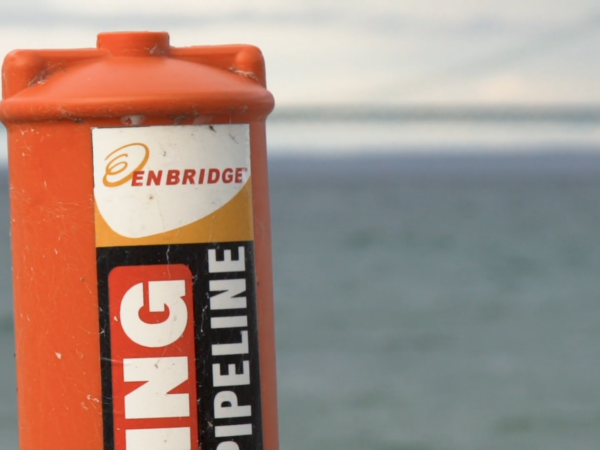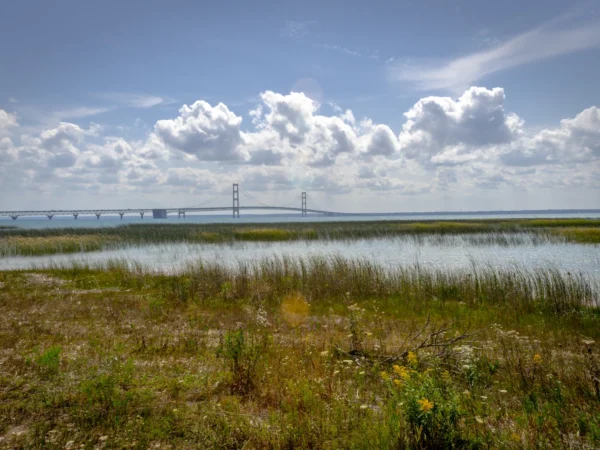
By Lester Graham, Michigan Radio
The Great Lakes News Collaborative includes Bridge Michigan; Circle of Blue; Great Lakes Now at Detroit Public Television; and Michigan Radio, Michigan’s NPR News Leader; who work together to bring audiences news and information about the impact of climate change, pollution, and aging infrastructure on the Great Lakes and drinking water. This independent journalism is supported by the Charles Stewart Mott Foundation. Find all the work HERE.
A report for a gas and oil industry group predicts gasoline and diesel prices will jump and stay high in this region if Enbridge Energy’s Line 5 is shut down by politicians or the courts. Governor Gretchen Whitmer ordered the pipeline to shut down, but the Canadian company did not comply and went to court.
A news conference discussing the report from the Texas-based Consumer Energy Alliance started out with a Michigan voice. Representative Sara Cambensy, a Democrat from the Upper Peninsula, said Line 5 needs to continue to pump oil. She said a proposed tunnel under the Straits of Mackinac to house a replacement segment for the nearly 70-year-old pipeline is the only way to ensure energy security for the state.
“I found that those opposed to building the tunnel didn’t really have a plan. They had no ideas and talking points about how they envision transporting fuel or propane,” she told reporters.
The experts who wrote the report said they were asked to look at whether fuel prices would be affected if Line 5 suddenly stopped operating.
Terry Clower is a professor of public policy at George Mason University. He and his partner, an economist, said there’s never been a case where a pipeline was shut down by a state government, so they had to analyze something similar.
“We decided to look at what happens to fuel prices when refineries are shut down due to a disaster event like a hurricane,” Clower said.
They based their predictions based on what happened when Hurricane Katrina forced refineries to close.
If Line 5 shuts down, “we project that the restriction in fuel in fuel supplies will cause an increase of between 9.47 percent and 11.66 percent,” he said. “In the states of Ohio and [southeast] Michigan that is on top of any other market-based increase.”

The Line 5 pumping station near Mackinaw City. (Lester Graham/Michigan Radio)
At today’s prices, the high side would amount to a more-than 40 cents a gallon increase for gasoline.
Environmentalists think the report makes some wrong assumptions.
Sean McBrearty is with Clean Water Action. He said two refineries are not going to stop operating if Line 5 shuts down. All the refineries in Toledo and Marathon in Detroit get their oil from more than just Line 5.
“Actually they receive oil from several different sources. They receive a small percentage of their oil from Line five, and they would not be impacted in this way by a Line five closure,” he said.
In research for a previous story, I asked Marathon how dependent it is on Line 5. The company said that’s not information it reveals. It’s proprietary.
Clower also said that other refineries could not make up the difference because they are generally operating at close to full tilt. And he said there’s another problem.
“There does not appear to be an existing pipeline capacity to accommodate a shift to relying on other refineries to replace its lost production at the Toledo refineries.”
Clean Water Action’s McBrearty finds fault with that as well.
“It fails to take into account existing pipeline capacity when Line 6B spilled into the Kalamazoo, and it was rebuilt as the new line seventy eight. They actually doubled the capacity of the pipeline.”
We don’t know how much of that capacity Enbridge is already using, but in December, the consultancy firm Wood Mackenzie reported only about half of the U.S. oil pipeline capacity is being used right now.
McBrearty added that studies commissioned by three different environmental groups all indicate there would be a price increase if Line 5 shut down, but the additional cost would be much smaller than the Consumer Energy Alliance predicts. One predicted a fraction of a cent per gallon in the U.S.
McBrearty noted that when Line 5 was mandated to shut down for two weeks and then operate at half capacity for a couple of months after that, fuel prices in the region didn’t budge.
Rep. Cambensy said there are even more important reasons than avoiding higher fuel prices to prevent Michigan from losing Line 5.
“Pipelines are the safest way to transport oil and gas. They keep our jobs, our industry, our citizens and our businesses functioning. And we cannot afford to buy in to the false lies and tales that we’re being told.”
But some businesses that rely on the Great Lakes, Native American tribes, and others opposed to building a tunnel under the Straits for a new segment of Line 5 have said none of us can afford an oil spill in the Great Lakes from the pipeline sitting on the lake bed. They said it’s too risky not to shut it down. It’s nearly 70 years old now and it could take years longer to get regulatory approval and then build a tunnel.
Enbridge Energy is one of Michigan Radio’s corporate sponsors.
Catch more news on Great Lakes Now:
New report finds Enbridge Line 5 closure will cause little pain to Michigan
Enbridge returns to court for Line 5 permit
Featured image: A map of Enbridge pipelines around the Great Lakes area. (Photo Credit: Enbridge Energy/Public Copy)




